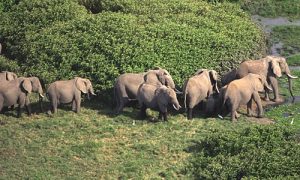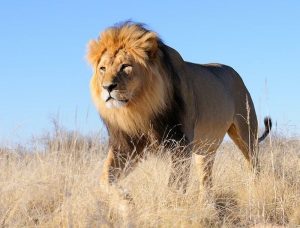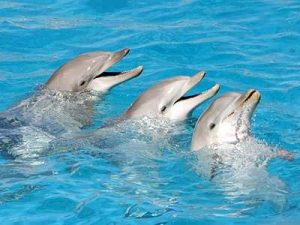The idea of human cognitive superiority is weakening due to lot of studies being conducted by scientists. Professor Maciej Henneberg, a professor of anthropological and comparative anatomy from the School of Medical Sciences, at the University of Adelaide, says animals often possess different abilities that are misunderstood by humans. He says that animals do not understand us, and we do not understand them, this does not mean our ‘intelligences’ are at different levels; they are just of different kinds. We often misinterpret a foreigner when he tries to communicate with us using an imperfect, broken, version of our language. We think he is not intelligent. Similarly, we underestimate the animal intelligence because of lack of language and technology. But, they are far more intelligent than us.
Some mammals, like gibbons, can produce a large number of varied sounds, over 20 different sounds with clearly different meanings that allow these arboreal primates to communicate across tropical forest canopy. The fact that they do not build houses is because they are irrelevant to the gibbons. Many quadrupeds (four feet animal) leave complex olfactory (sense of smell) marks in their environment, and some, like koalas, have special pectoral glands for scent marking. Humans, with their limited sense of smell, cannot even determine the complexity of messages contained in olfactory markings, which may be as rich in information as the visual world, says Maciej Henneberg. He also says that domestic pets also give us an insight into mental abilities of mammals and birds. They communicate to us their happiness, sadness and demands and make us do things they want from us. Thus, the animal world is much more complex than we give it credit for.
Have the grit to stand up after a fall: Take the example of the birth of a baby giraffe; it is quite horrific event. The baby falls from its mother’s womb, some eight feet above the ground. It droops and shrivels up and lies still, due to its weakness to move. The mother giraffe lovingly lowers her neck to smooch the baby giraffe. Then a miracle happens…..she lifts her long leg and kicks the baby giraffe, sending it flying up in the air and falling down on the ground. As the baby lies curled up, the mother kicks the baby again and again, until the baby giraffe which trembles and pushes its limbs and first time learns to stand on its feet. Happy to see the baby standing on its own feet, the mother giraffe comes over and gives it yet another kick. The baby giraffe falls one more time, but now quickly recovers and stands up. Mama Giraffe is happy. She knows that her baby has learnt an important lesson of standing on its own feet. Why does the mother giraffe do this? She knows that lions and leopards love giraffe meat. So unless the baby giraffe quickly learns to stand and run with the pack, it has very little chances of survival.
Follow your nose: Lions don’t stop searching until they find their prey. Their smelling sense is very strong. Like all cats they possess a special olfactory organ on the roof of the mouth called a Jacobson’s organ. Lions have pride, they find their own food. The king of animals takes lots of rest; he maintains his majesty by rejuvenating his energy after a good sleep. He roars making his command on the rest of kingdom figuratively. It is one of the loudest calls in the animal kingdom and can be heard from up to 8km away. …Lions roar to tell other lions where they are, to show how big they are and to warn lions from other groups to keep away from their home territory.
Follow your own path: It seems horses tend to live pretty independently, and often stray from the pack whenever they feel like exploring one of their own. While they have a majestic, fantastic appearance, they also have a fierce, stubborn side that takes them into unexplored territory and allows them to pave their own path. Be like the horse and run freely into the wind devoid of worries and too much of thinking of what the consequences might be. Horses teach us the lesson to follow our dreams; get out of the herd mentality. Take a road which is not very familiar. Follow your gut feeling, than taking thousand of advises.
Listen more talk less: Dolphins actually communicate with one another via high-pitched whistling noises, and each one makes a unique sound that other dolphins can immediately recognize. It is hard to believe that each dolphin has a unique whistle called a ‘signature whistle’, which is used to recognize an individual. They have very advanced communication techniques; in a way they listen more and talk less. They keenly listen to the whistling of each other in order to understand each other’s location in the vast big ocean. If they all whistled at once, none of them would be able to find one another. They have honed their listening skills in order to function well as a group. We humans should specially learn from dolphins that listening to another person is the most important life skill.
Get back to your sweet home: It seems when a rabbit gets startled, he bolts from his hiding place and takes off running. It looks like he’s running away, but eventually, that rabbit will run in a circle and come back to his hideout. The rabbit does this because he’s returning to the last place he felt safe. After all the running around, we do in our life we prefer getting back to our homes. It’s the safest place for us and it helps us build back our energies.
Unity has strength: Ants, in particular, are an excellent example of this in action. They carry tiny small particles of dirt underground to form complex tunnels and living systems, tackle prey as a team, and help each other carry leaves back to their colony to use as mulch for raising fungus, which they eat to survive. They work harder than many species just to get through each day, and they do it as a team. No one gets left behind, and no one carries all the weight. They are united while working, no one works more or no one works less.
Elephant’s memory: The wild animal is famous for its memory which is most important for their survival and their herd. Each herd has a matriarchal structure, with one older female in charge. There is proof of elephants’ long memories: when confronted with an unfamiliar elephant, matriarchs huddles defensive position, because they realize that those elephants could pose a threat to the herd’s safety. Elephants can keep track of up to 30 absent members of their family by sniffing out their scent and building a mental map of where they are. One research has also proved that elephants can tell whether a human is friendly or a threat by their scent and colour of clothing.
Even chimpanzees can easily beat humans at recalling a set of numbers that was displayed for a fraction of a second.
Darwin has said that animals have emotions such as excitement, sadness, compassion, love, they have theory moods too. He went on to say that there is no fundamental difference between man and the higher mammals in their mental faculties. We are not superior to animals.
















































